Lesson 31-40
新概念一册31--40课练习
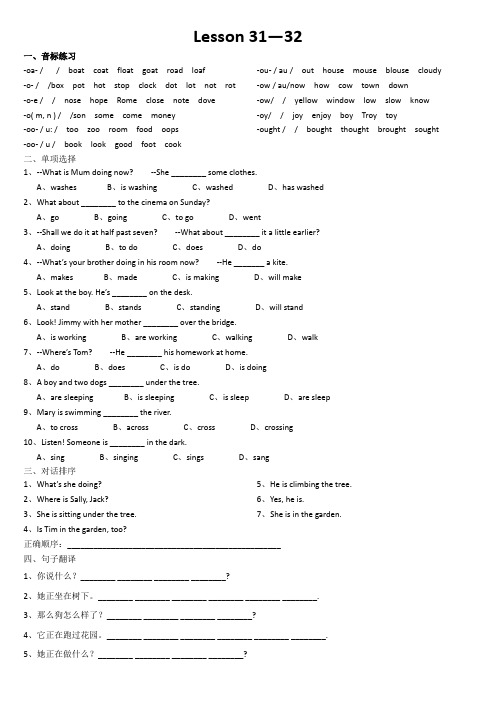
-oa- / / boat coat float goat road loaf-o- / /box pot hot stop clock dot lot not rot -o-e / / nose hope Rome close note dove-o( m, n ) / /son some come money-oo- / u: / too zoo room food oops-oo- / u / book look good foot cook -ou- / au / out house mouse blouse cloudy -ow / au/now how cow town down-ow/ / yellow window low slow know-oy/ / joy enjoy boy Troy toy-ought / / bought thought brought sought二、单项选择1、--What is Mum doing now? --She ________ some clothes.A、washesB、is washingC、washedD、has washed2、What about ________ to the cinema on Sunday?A、goB、goingC、to goD、went3、--Shall we do it at half past seven? --What about ________ it a little earlier?A、doingB、to doC、doesD、do4、--What’s your brother doing in his room now? --He _______ a kite.A、makesB、madeC、is makingD、will make5、Look at the boy. He’s ________ on the desk.A、standB、standsC、standingD、will stand6、Look! Jimmy with her mother ________ over the bridge.A、is workingB、are workingC、walkingD、walk7、--Where’s Tom? --He ________ his homework at home.A、doB、doesC、is doD、is doing8、A boy and two dogs ________ under the tree.A、are sleepingB、is sleepingC、is sleepD、are sleep9、Mary is swimming ________ the river.A、to crossB、acrossC、crossD、crossing10、Listen! Someone is ________ in the dark.A、singB、singingC、singsD、sang三、对话排序1、What’s she doing?2、Where is Sally, Jack?3、She is sitting under the tree.4、Is Tim in the garden, too?5、He is climbing the tree.6、Yes, he is.7、She is in the garden.正确顺序:_________________________________________________四、句子翻译1、你说什么?________ ________ ________ ________?2、她正坐在树下。
新概念英语一课一练2 Lesson 31-40
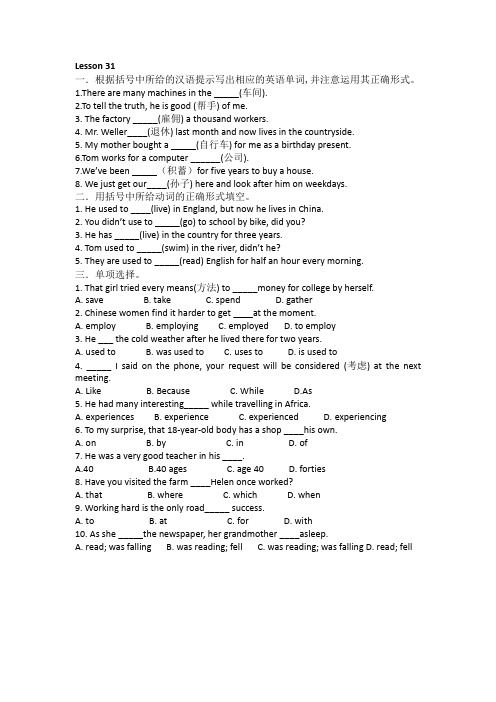
一.根据括号中所给的汉语提示写出相应的英语单词,并注意运用其正确形式。
1.There are many machines in the _____(车间).2.To tell the truth, he is good (帮手) of me.3. The factory _____(雇佣) a thousand workers.4. Mr. Weller____(退休) last month and now lives in the countryside.5. My mother bought a _____(自行车) for me as a birthday present.6.Tom works for a computer ______(公司).7.We’ve been _____(积蓄)for five years to buy a house.8. We just get our____(孙子) here and look after him on weekdays.二.用括号中所给动词的正确形式填空。
1. He used to ____(live) in England, but now he lives in China.2. You didn’t use to _____(go) to school by bike, did you?3. He has _____(live) in the country for three years.4. Tom used to _____(swim) in the river, didn’t he?5. They are used to _____(read) English for half an hour every morning.三.单项选择。
1. That girl tried every means(方法) to _____money for college by herself.A. saveB. takeC. spendD. gather2. Chinese women find it harder to get ____at the moment.A. employB. employingC. employedD. to employ3. He ___ the cold weather after he lived there for two years.A. used toB. was used toC. uses toD. is used to4. _____ I said on the phone, your request will be considered (考虑) at the next meeting.A. LikeB. BecauseC. WhileD.As5. He had many interesting_____ while travelling in Africa.A. experiencesB. experienceC. experiencedD. experiencing6. To my surprise, that 18-year-old body has a shop ____his own.A. onB. byC. inD. of7. He was a very good teacher in his ____.A.40B.40 agesC. age 40D. forties8. Have you visited the farm ____Helen once worked?A. thatB. whereC. whichD. when9. Working hard is the only road_____ success.A. toB. atC. forD. with10. As she _____the newspaper, her grandmother ____asleep.A. read; was fallingB. was reading; fellC. was reading; was fallingD. read; fellYesterday afternoon Frank Hawkins was telling me about his expcriences 1 a young man. Frank is now the 2 of a very large business company, but as a boy he used to 3 in a small shop. It was his job 4 bicycles and at that time he used to work fourteen hours a day. He 5 money for years and in 1938 he bought a small workshop 6 his own. In his 7 Frank used to make spare parts for aeroplanes. At that time he had two helpers. In 8 years the small workshop had become a large factory 9 employed seven hun dred and twentyeight people. Frank smiled when he 10 his hard early years and the long road 11 success. He was still smiling 12 the door opened and his wife came in. She wanted him to repair their son's bicycle!五.根据括号中的提示,把下列句子翻译成英语1.这种工作需要在电脑方面有丰富的经验。
新概念英语第三册 31-40 课后作文标准答案

Lesson 31 A lovable eccentricKey to CompositionA possible answerA true eccentricMr. Chew is a man who has lived in our small town for years. He is a large man (some would say "fat"), he has a round face, a big black moustache and a bald head. He always wears the same clothes—black trousers, a white shirt and a red waistcoat, and is always po-lite to everyone he meets.He owns an antiques shop near the river, and he lives "over the shop". No one knows where he gets his things, but there are always lots of different interesting antiques in the shop window every week.Mr. Chew is interested in politics, too. Every week he puts up strange notices in his shop window to passers-by. Usually the notices are trying to make people save a local building or stop a plan to build a road through the town. Every time there is a national election, he automatically stands for parliament and gives speeches almost every day in the town park saying what he would do if he were Prime Minis-ter. (He usually says he would make sure that antiques dealers did not have to pay Income Tax and that no cars should be allowed into our little town at all. ) Every year he gets a few votes, but not enough to worry the serious candidates.For most people Mr. Chew is a harmless eccentric, and everyone likes talking to him. After all, he is someone who adds colour to the dull routine of their daily lives. (248words)Lesson 32 A lost shipKey to CompositionA possible answerThe last dayThe journey has gone well so far. We are now on the way to Russia and hope that we shall arrive with no more problems. But we are watching the sea and sky. The convoy successfully fought off an air attack early this morning. No ships were lost and we managed to shoot , down threeenemy aircraft before they broke off the attack.At 10 a. m. this morning we were attacked by a U-boat. This was the first time we had been attacked and for most men on board this was the first time they had been in action at sea. We were fortunate, but the ship ahead of us, the Dauntless, was torpedoed and sunk. After the ship sank, there were hundreds of men in the sea. We picked up as many survivors as we could in the Karen. In fact in [ the end we picked up 720 men, which meant that 50 men lost their lives in the attack on the Dauntless,The Karen was packed with men, many crowded on the open decks, when we turned and attacked the U-boat. Depth charges were I dropped and the U-boat was put out of action.It is now 3. 15 p. m. , the light is already beginning to fade and storm clouds are gathering. We are about to be attacked by a second U-boat, this time from the north. The captain has just announced —(239words)Lesson 33 A day to rememberKey to CompositionA possible answerMistaken identityWe have all experienced days when everything seems to go wrong. Things certainly went wrong for Ray, a friend of mine, one day last month. It all started, as these things do, with a simple case of "mistaken identity". Ray had been shopping and was loaded with par-cels when he got back to the multi-storey car park to look for his car. He knew he was on the correct level, but he couldn't see his car any-where.Then, suddenly, while he was looking, he saw one exactly like it. It was a red Nissan. It was exactly the same as his own car, and naturally he mistook it for his own. Still holding the parcels, he felt in his jacket pockets and found his key. He tried to open the driver's door, but the key just wouldn't turn. He couldn't understand it. In the end, he forced the lock — and naturally broke the key.At that point he dropped the parcels as well. This infuriated him. The only way he could get into his car was to break a window, so he deliberately smashed the window of the car. As he was putting his hand in, the owner came back and saw him. The owner rushed to-wards Ray, held him against the car, and called a policeman on his mobile phone.When Ray was arrested, he tried to explain, but the police did not believe him — until they found Ray's car on a level below! (246words)Lesson 34 A happy discoveryKey to CompositionA possible answerAn antique shop"The Antique Shop" has been in the little street near the church for years. As you look at it from across the road, it draws you to-wards it. It has one large window display designed to attract all sorts of customers. There is expensive glass, porcelain and jewellery to at-tract people with a lot of money; there is second-hand furniture, modem silver and other things (hardly antique!) to attract those with not so much.When you enter the shop, a little bell rings and the owner, a little grey-haired old lady called Mrs, Century, comes out from a room at the back and greets you like a lost relative! She greets everyone the same and always with a smile.The shop sells all kinds of antiques. There are shelves full of old books along the back of the shop. There are two large tables in the middle of the shop covered with pieces of glass and porcelain. Then, around the walls on the floor are large pots, brass statues and things. There are lots of painting on the walls, too. At the weekend, the shop usually has five or six customers in it at one time. You might find a professional antique collector, a holiday couple and a young mother (with child in pram) looking for a cheap antique for her husband's birthday.We all like looking for unusual things and hope to find a bargain one day. You might find one in Mrs. Century's "Antique Shop". (249words)Lesson 35 Justice was doneKey to CompositionA possible answerA burglary that went wrongThere is a large jewellery store in the town that I have often wanted to rob. A few weeks ago I started planning the theft and kept a close watch on the shop. I noticed when people went in and out, when they started and finished work, and so on. And I noticed the chimneys, too.One night I climbed onto the roof of the store and looked for a way in. One of the chimneys seemed wide enough for me to get in, ss I started climbing down. Very soon, however, I got stuck and had to climb out again. I didn't give up. I looked around, found another chimney that looked quite wide at the top and climbed down that one. Again I got stuck.This time, however, I was really stuck. I could climb neither up nor down. At first I struggled to try to free myself, but I couldn't get out. Then I started to get scared and started sweating. I tried to calm myself by quietly counting and thinking of pleasant things. But nothing worked and finally I started shouting for help. Nothing happened, everything was dark and silent, and I got more and more frightened.I think I went to sleep because I suddenly realized that light was shining down the chimney. I shouted and shouted. Eventually I heard tapping and was finally freed by Fire fighters who had smashed a hole in the chimney. (240words)Lesson 36 A chance in a millionkey to CompositionA Possible answerThe pastWhen the war finished, Franz Bussman did everything he could to get information about his brother Hans. With no information, he reluctantly assumed his brother was dead, and gave up the searchWith no family, and having been unable to find his brother, Franze found it difficult to settle down. Over the years he moved from place to place and from job to job, never staying very long in one place.When he met Anna (now Mrs. Bussman), he was working as a waiter in a hotel. He and Anna got married and Franz settled down at last. He moved from the dinning room into the kitchen of the hotel and became a cook. But this did not last very long. He was talking to a friend one day, a taxi driver, who suggested that they should go into partnership So they did, and Franz became a taxi driver. He and the friend drove taxis themselves, but they also soon owned four more taxis and employed four drivers.He visited his home town once to visit his old house, but it was a sad visit. There was a large modem block of flats where his family house used to be. ' And although he spoke to some of the apartment owners, no one remembered him or his family. Now that he has finally found his brother Hans, he and Anna are planning to invite Hans to come and live near them and work as a taxi driver in the company. (250words)Lesson 37 The Westhaven ExpressKey to CompositionA possible answerA disastrous train journeyWhen. I finally boarded the train. I was looking forward to a pleasant journey to the village of Slowleigh where my friends live. I sat in my seat, got out a book and was already reading when the train startedAccording to the timetable, the train was due to arrive in Slowleight at 4. 30. I had been so interested in my book that I had a shock when I looked at my watch. It was almost 4. 30. I closed my book and waited for the train to slow down. It didn't. In fact, the train was going very fast —and that was Slowleigh, wasn't it?! The train went straight on. I asked the other passengers why the train hadn't stopped and they told me it was the express to the city. I didn't believe it.Then the ticket collector came along. He looked at my ticket and I tried to explain, but in the end I had to pay the full fare to the city.By the time we arrived in the city it was six o'clock. The journey had lasted two hours and I was miles away from my original destination. I rang my friends and said I would get a fast train back. Then I checked the timetable: there was no fast train back to Slowleigh, only a slow one, at 7 o'clock. By the time I finally reached Slowleigh Station, it was nine o'clock at night. My pleasant little train journey had taken 4. 5 hours! (250words)Lesson 38 The first calendarKey to CompositionA possible answerStudying the pastFuture historians will have plenty of sources from which to learn about twentieth-century man. Not only will they have the written word, they will also have films, videos, audio cassettes, CDs and . CD-ROMs. In fact, they will have so much source material that they will hardly know where to start!If they study all the material available, they will be able to build up a complete social and political history of our time. They will know exactly how we dressed, what we ate in every different country and they will know exactly what our homes were like. They will know what our towns and cities were like and what forms of entertainment we enjoyed. In fact, they will not only learn about our forms of en-tertainment, they will be able to enjoy a lot of them, too — our music, plays, musical shows, video games, our art, our literature, . . . . And they will be able to read and see the news day by day as it happened.They will learn in detail the way we fought our wars — the way we used jet fighters, helicopters, ships and tanks. They will be able to learn every detail of great moments in history, and everything about leading figures of the time as well as the lives of ordinary, men and women.In future, the study of history will provide interest and excitement for a lot of people, the past will be brought to life and history will no longer be boring.(249 words)Lesson 39 Nothing to worry aboutKey to CompositionA possible answerBruce remained unperturbedIt was typical of Bruce to announce "cheerfully" that there was no oil in the engine! For the restof us, it was a disaster. We all got out and began shouting at him and then at each other. What could we do? We were standing in the middle of a very large pool up to our ankles in water with a car that was useless.We tried to push it, but of course it was absolutely impossible. All we managed to do was to push it deeper into the soft mud. In the end we all walked to next village where we tried to get a taxi so that we could take some oil (and petrol) back to the car.We couldn't find one driver who would take us over the rough road. Fortunately there was a small garage and we paid a large sum of money to the garage owner to rent a jeep. With a can of oil and an extra can of petrol we all climbed in and set off.When we eventually got back to the pool, we attached a rope from the jeep to the car and pulled the car out of the water. We were not surprised to find that the engine was badly damaged, and would not even start with the oil we had brought back. Disaster again, but Bruce was undismayed!(230 words)Lesson 40 Who's whoKey lo CompositionA possible answerArrest the policeThe policeman who accompanied the workman lo the pay phone still did not realize that they had been the victims of a practical joke. When he and the worker returned to the scene of the hoax right outside the university gates, the other workman was still quarrelling with the police and resisting arrest.Following the worker's call to the police station, it was not long before more police arrived on the scene — and it is at this point that the story becomes very complicated! The workmen told the police who had just arrived that the first lot of policemen were actually stu-dents dressed up as policemen. The second lot of police therefore threatened to arrest the first lot of police, but before they did so, they asked for their identity cards. The first lot ignored this request and said that they really were policemen, but that the workmen were stu-dents. The workers had to prove their identity, too, they said.None of them had to prove their identity by showing identity cards, because at this point two or three of the policemen started laugh-ing, and then the workmen started laughing, and in the endthey were all laughing. They finally realized that they had all been victims of a hoax — and not one of them could remember what the student had looked like. "After all, " said one workman, "they all look the same tome. " (237 wards)。
新概念第一册一课一练31--60课

Lesson 31—32常用词组与语言点1. run after --- 追逐2. in the garden --- 在花园里3. under the tree --- 在树下4. what about sb./ sth ---怎么样what about doing 做----怎么样5. climb the tree 爬树6. I beg your pardon? 请你再说一遍一、辩音( )1. A. garden B. grass C. after D. cat( )2. A. across B. cat C. thank D. handbag( )3. A. who B. blue C. whose D. under( )4. A. garden B. bed C. blue D. whose( )5. A. run B. under C. put D. umbrella( )6. A. cook B. tooth C. book D. good( )7. A meal B. meet C. heavy D. he( )8. A. drink B. orange C. thank D. think( )9. A. basket B. type C. bone D. blue( )10. A. bone B. window C. how D. own二、补全单词( )1, ciga_____tte A. re B. er C. ri D. ir( )2, t__e A. py B. iy C. yp D. pi( )3, cli___ A. bm B. m C. b D. mb( )4, tr____ sers A. au B. oa C. ou D. ow( )5, ac___ss A. ro B. or C. ou D. oa ( )6, ster____ A. ao B. eo C. oe D. oa ( )7, g___ss A. ar B. ir C. ra D. or ( )8, g__den A. ar B. ir C. ra D. or ( )9, tr___ A. or B. ir C . ee D. re三、用所给词的适当形式填空1. ____ these bottles on the table. (put)’s _____ under the tree. (sit)3. Please give ____ an apple. (I)4. There are some ____ on the plate. (knife)5. What are you _____ ? (do)6. Dust the ______table. (dress)7. They are _______after the dog. (run)8. Take off _____ coat, please. (you)9. What must I ______ ?(do)10. My mother is _______ the bed. (make)四、连词成句1. after, the, running, boy, is, the, dog2. is, the, he, tree, climbing3. on, stereo, the, turn, please4. garden, the, in, Tom, sitting, is五、句型转换1. The girl is turning on the tap. 〔变为否认句〕2. Jack is reading a magazine. 〔变为一般疑问句〕3. The children are playing on the playground. 〔变为否认句〕4. Open the window. 〔用he做主语改为如今进展时〕5. They are sitting under the tree. 〔变为否认句〕6. They are watching TV at the moment. 〔变为一般疑问句〕7. Make the bed. 〔用I做主语改为如今进展式〕8. I am cleaning my face. 〔就划线局部提问〕9. Tom is climbing the tree. 〔就划线局部提问〕10. She is in the garden. 〔就划线局部提问〕答案一、1—5 DADBC 6—10 BCBAC二、1—5 ACDCA 6—9 BCAC三、put, sitting, me, knives, doing, dressing, running, your, do, making四、略五、1—2 略3. The children are not playing on the playground.4. he is opening the window. 5, 略6, are they watching TV a the moment? 7, I am making the bed. 8. What are you doing? 9. Who is climbing the tree? 10. Where is she?Lesson 33—34常用词组与语言点1, a fine day --- 好天气2, with one’s family----和家人在一起3, fly over---从…上飞过4, look at----看….5, some clouds----几朵云6, in the sky---在天上7, on the river---在河面上8, under the bridge----在桥下一、辩音( )1. A. day B. make C. plane D. family( )2. A. over B. window C. boat D. aeroplane( )3. A. walk B. tall C. wall D work( )4. A. river B. ship C. family D. right( )5. A. sleep B. sweep C. see D. near( )6. A. wash B. hat C. have D. fat( )7. A. cry B. family C. very D. empty( )8. A. cloud B. house C. boat D. how( )9. A. bridge B. day C. door D. window二、补全单词写出汉语意思1. loo___ ---( ) 2, cl___ ___ d ---( )3. sh___ p ---( ) 4, sk__ ---( )5, sh__ne ---( ) 6, f__ m __ ly ---( )7. bo__t ---( ) 8, w___ fe ---( )9, __ __ der ---( ) 10, __ ly ---( )11, __ ver ---( ) 12, b__ __ dge ---( )13, r__ ver ---( ) 14, ae__ __ pl__ ne ---( ) 三、单项选择( )1. They ____ over the bridge now.A. walkB. walkingC. are walkingD. is walking ( )2. The aeroplane is flying ___ the bridge.A. onB. ofC. outD. over( )3. They are looking ___ the sky.A. atB. overC. onD. in( )4. There is a bridge ____ the river.A. onB. overC. inD. at( )5. ____ is a fine day today.A. ThatB. ThisC. ItD. Today答案一、DDDDD AACA二、略三、CDABCLesson 35—36常用词组与语言点1, out of --- 从…里出来2, in a valley---- 在山谷中3, a photograph of----一张…的照片4, wait for----等待5, along the banks of the river---- 沿着河岸6, under the bridge----在桥下7, jump off ( the wall)---- 〔从墙上〕跳下一、辩音( )1. A. wife B. off C. knives D. photo ( )2. A. another B. along C. long D. hot ( )3. A. water B. bank C. have D. thank ( )4. A. build B. under C. umbrella D. cut ( )5. A. basket B. park C. water D. grass ( )6. A. into B. photo C. go D. note ( )7. A. village B. valley C. cat D. have ( )8. A. along B. long C. thank D. into ( )9. A. village B. he C. she D. see ( )10. A. cloud B. our C. house D. over 二、写出以下单词的如今分词形式1, eat---( ) 2, run---( )3, wash---( ) 4, cry---( )5, jump---( ) 6, empty---( ) 7, make---( ) 8, wait---( )9, sit---( ) 10, climb ---( ) 三、单项选择( )1. He is coming out ____ the building.A. ofB. onC. atD. over( )2. They are waiting ___ a bus.A. atB. inC. onD. for( )3. Please turn ____ the radio.A. onB. atC. ofD. for( )4. The children are jumping ____ the wall.A. offB. atC. inD. for( )5. Some boys are going ____ the park.A. onB. atC. ofD. into( )6. Here is a photograph ____ the village.A. atB. ofC. out D over( )7. Tom is swimming ____ the river.A. acrossB. outC. ofD. at( )8. The cat is running ____ the wall.A. alongB. inC. ofD. at( )9. There is a table ___ the middle of the room.A. atB. ofC. inD. after( )10. He is sitting ____ his mother.A. besideB. inC. forD. at( )11. Please take ____ your coat.A. atB. onC. in D, off( )12. The pictures are __ the wall.A. onB. atC. offD. out( )13. The boy is running ____ a dog.A. atB. onC. afterD. in四、改错1. The child crying.2. They not walking over the bridge.3. What are you do?4. The woman is waiting at the bus.5. He is puting on his coat.6. He is swiming across the river.7. My mother is makeing the bed.8. What are the child doing?9 Coming in, please.10. The dog is eatting bones.答案一、1—5 CAAAC 6—10 AADAD二、略三、1—5 ADAAD 6—10 BAACA 11—13 DAC四、1, crying-is crying 2, not-are not 3, do-doing 4, at-for 5, puting –putting6, swiming –swimmign 7, makeing-making 8, are-is 9, coming –come 10, eatting-eatingLesson 37—38常用词组与语言点一、辩音( )1. A work B. word C.. nurse D. walk( )2. A. pink B. thank C. thin D. think( )3. A. make B. famous C. favorite D. have( )4. A. listen B. bed C. red D. heavy( )5. A. dish B. fish C. wash D. teacher( )6. A. eight B. paint C. case D. hammer( )7. A. home B. work C. window D. own( )8. A. do B. umbrella C. dust D. come( )9. A. case B. same C. is D. this( )10. A. give B. favorite C. pink D. ice二、根据句子意思完成句子1. This _________〔书架〕is small.2. Pink is her ________〔最喜欢的〕color.3. They are working ___________〔努力地〕4. I am going to __________〔刷油漆〕it red.5. Give me that _______〔榔头〕, please.三、用所给动词适当形式填空1. They ________ ( not, wash) the dishes after dinner.2. I _______ (wash) some clothes this afternoon.3. What _______ you _____ (do) tomorrow?4. Now she ________ (listen) to the radio.5. Listen! Who _________ (sing) in the next door?6. Look! The bus _______ (come).7. I am ______ (make) a bookcase.8. ---_________ (be) they going to the park this Sunday?----Yes, they _________ (be)四、用适当介词填空1. They are waiting _____ the bus.2. This beautiful dress is _____ my daughter.3. Give the hammer _____ me, please.4. Tom is listening _____ the radio now.5. He stays ______ home today.答案一、1—5 DCDAD 6—10 DBACD二、略三、1. are not going to wash 2. Am going to wash 3, are going to, to 4, is listening 5, is singing 6, is coming 7, making 8, are, are四、1, for 2, for 3, to 4, to 5, atLesson 39—40常用词组与语言点1. in front of 在…前面2. do with 对付,处置3. be careful 留神,小心点4. give sb. sth = give sth. to sb. 给某人某物show sb. sth = show sth. to sb. 给某人看某物send sb. sth = send sth. to sb. 送给、寄给某人某物5. listen to sb. 听某人讲6. There we are. 我们在这7. on the shelf 在架子上8. drop sth. 把某物摔了一、辩音( )1. A. vase B. grass C. hat D. fast( )2. A. flower B. house C. how D. word( )3. A. drop B. hot C. come D. dog( )4. A. show B. how C. town D. cloudy( )5. A. send B. bed C. he D. heavy( )6. A. front B. come C. some D. to( )7. A. careful B. hair C. here D. air( )8. A. there B. thank C. they D. then( )9. A. over B. drop C. window D. boat( )10. A. careful B. some C. cup D. clean二、根据汉语完成句子1. _______ _______〔翻开〕the lights.2. He is washing the ___________. 〔盘子〕3. Those ____________〔花〕are lovely, too.4. Don’t _____________〔摔下〕it.5. What are you going to do with that ____________. 〔花瓶〕6. He is going to ______ _______〔听〕the stereo.7. We are going to do our ___________〔作业〕8. Be __________〔小心点〕9. He is sitting in _________ ________〔在…前面〕me.10. I am going to __________〔刷油漆〕it pink.三、与所给单词适当形式填空1. ____________(do) your homework now.2. ____________ ( show) me your photo.3. They are going to __________ (wait) for a bus.4. Don’t _________ (drop) the vase.5.. What are you going to ______ (do) with it?6. He is _______ (do) his homework.7. _______ (give ) it to me, please.8. ________ (be) careful!9. Don’t ________ (put) it on the table.10. Now we are ________ (listen) to the stereo.四、介词填空1. Put the box _____ the shelf.2. Take _____ your books and read ________ me.3. She’s looking ____ the new dress ________ the shop window.4. Lucy’s sitting _____ her father and mother.5. Who’s the boy _________ Jim?五、句型转换1. Do that, please. 〔改为否认句〕2. This book is for me. 〔改为否认句〕3. I am going to do my homework. 〔就划线局部提问〕4. He is shaving now. 〔改为一般疑问句〕5. They are working hard. 〔就划线局部提问〕6. Turn on the radio. 〔用he做主语改为一般将来时〕六、汉译英1、我打算送她一些花。
新概念青少版4a单词表
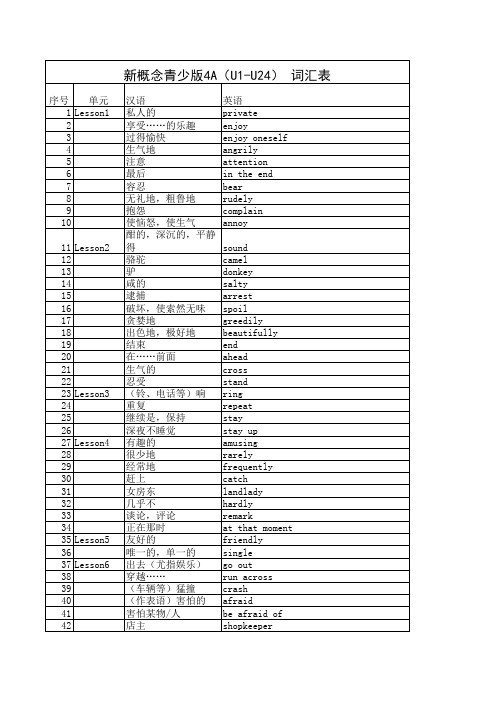
307
乘客
passenger
308
回答,做出反应
respond
309 lesson29 精神紧张的
nervous
310
从…抬头看
look up from sth
311
负担得起
afford
312
压力
pressure
313
面临压力
unter pressure
value
146
抢劫
rob
147
抢劫某人的某物
rob sb of sth
148 lesson15 使参加
enter
149
为…报名参加…
enter sb for sth
150
整齐的,整洁的
neat
151
小路,小径
path
152
孔子
Confucius
153 lesson16 相貌好看的
good-looking
249
演出
perform
250
对…实行,在…表演 perform sth.on sb/sth
251
缺席的,不在的
absent
252
缺席某事
absent form
253
创造
create
254
航行
voyage
255
发生
take placeΒιβλιοθήκη 256海洋ocean
257 lesson25 小组,团体
group
参加…
take part in sth
241 lesson24 行李
luggage
242
喂养
feed
243
新概念英语第一册第31课

★ who pron.谁
谁在那? Who is there? 谁是你的老师? Who is your teacher? 谁来的电话? Who is that?
★ run v.跑
(跑步的人) runner running shoes 跑鞋
刘翔跑得很快。 Liu Xiang runs fast.(变成现在进行时)
I beg your pardon? Who is climbing the tree?
Who’s climbing the tree?
★ Text
Tim is. What about the dog? The dog’s in the garden, too. It’s running across the grass. It’s running after a cat.
What about = How about
What about … 和 how about … 是英语口语中 常用的两个省略句型,它们的意思和用法基本相 同,常常用在以下场合。例如:
1. 向对方提出建议或请求。例如: How about going out for a walk? 出去散散步
After you. You first, please. 你先走。 run after.. 在……之后跑,追,追逐 一只狗正在追逐一只猫。 A dog is running after a cat.
★ across prep.横过,穿过
表面穿过 横游过河 swim across the river 横穿过街道 run across the street 和through的区别 through表示在物体内部穿过 穿过森林 walk through the forest 穿过教室 go through the classroom
新概念一册lesson31-40单科练与参考答案

新概念一册lesson31-40单科练和参考答案Lesson 31-32一、补全单词。
1. ac_ _ss A. roB. or C. ou D. oa2. t_e A. py B. iy C. yp D. pi3. cli_ A. bm B. m C. b D. mb4. tr_sers A. at B. oa C. ou D. ow5. ciga_tte A. re B. er C. ri D. ir6. ster_ A. ao B. eo C. oe D. oa7. g_ss A. ar B. ir C. ra D. or8. g_den A. ar B. ir C. ra D. or9. tr_ A. or B. ir C. ee D. re三、用括号中所给词的适当形式填空。
1. ________ these bottles on the table. (put)2. Sh e’s _______ under the tree. (sit)3. Please give ______ an apple. (I)4. There are some _____ on the plate. (knife)5. What are you _________? (do)6. Dust the ________ table. (dress)7. They are ________ after the dog. (run)8. Take off ______ coat, please. (you)9. What must I _______? (do)10. My mother is ________ the bed. (make)四、连词成句。
1. on, stereo, the, turn, please_______________________________.2. is, the he, tree, climbing_______________________________.3. garden, the, in Tom, sitting, is_______________________________.4. after, the, running, boy, is, the, dog_______________________________.一、句型转换。
新概念一册lesson31-40单科练和参考答案

新概念一册lesson31-40单科练和参考答案*新概念一册lesson31-40单科练和参考答案Lesson 31-32一、补全单词。
1. ac_ _ss A. roB. or C. ou D. oa2. t_e A. py B. iy C. yp D. pi3. cli_ A. bm B. m C. b D. mb4. tr_sers A. at B. oa C. ou D. ow5. ciga_tte A. re B. er C. ri D. ir $6. ster_ A. ao B. eo C. oe D. oa7. g_ss A. ar B. ir C. ra D. or8. g_den A. ar B. ir C. ra D. or9. tr_ A. or B. ir C. ee D. re三、用括号中所给词的适当形式填空。
1. ________ these bottles on the table. (put)2. Sh e’s _______ under the tree. (sit)3. Please give ______ an apple. (I)^4. There are some _____ on the plate. (knife)5. What are you _________ (do)6. Dust the ________ table. (dress)7. They are ________ after the dog. (run)8. Take off ______ coat, please. (you)9. What must I _______ (do)10. My mother is ________ the bed. (make)四、连词成句。
}1. on, stereo, the, turn, please_______________________________.2. is, the he, tree, climbing_______________________________.3. garden, the, in T om, sitting, is_______________________________.4. after, the, running, boy, is, the, dog_______________________________.一、~二、句型转换。
(完整版)新概念英语第一册所有语法点汇总)

新概念英语第一册所有语法点汇总Lesson 1 人称代词含有be动词的陈述句、否定句和一般疑问句Lesson 3 祈使句简单的倒装句Lesson 5 冠词Lesson 6 选择疑问句Lesson 7 特殊疑问句一般疑问句Lesson 9 How…?的一些社交上的用法形容词的意义与作用Lesson 11所有格形容词和所有格代词名词所有格Lesson 15 名词可数名词单数变复数的规则Lesson 16 名词复数-s或-es的发音规则Lesson 19 There be句型常见方位介词:in、on、over、under Lesson 21 动词的双宾语Lesson 23 定语Lesson 27 some, any一些Lesson 29 情态动词情态动词must的用法Lesson 31 时态:共十六种时态,时态是通过动词变化来实现的。
现在进行时Lesson 34 动词+ing的规则Lesson 35 短语动词Lesson 37 be going to句型宾语补足语Lesson 39 祈使句do的用法Lesson 40 词组:动词+介词Lesson 43 情态动词can的用法Lesson 47 一般现在时Lesson 48 序数词Lesson 49 动词加s(es) 规则动词不定式some、any用法Lesson 51 What…(be,look…) like? 频率副词Lesson 57 一般现在时与现在进行时Lesson 59 have/has的用法Lesson 61 主语+系动词+表语Lesson 63 each和every的区别Lesson 64 禁令Don’t and Mustn’tLesson 65 日期的表达反身代词Lesson 67 一般过去时动词的过去式变化否定疑问句Lesson 69 用介词at,on和in的时间短语Lesson 74 副词的用法副词的构成Lesson 75 宾语从句Lesson 79 Must与NeedLesson 83 现在完成时Lesson 85 现在完成时的特殊结构Lesson 89 for与sinceLesson 91 一般将来时Lesson 95 had better和mustLesson 99 宾语从句Lesson 100 直接引语和间接引语Lesson 101 反意疑问句Lesson 103 too与enough的用法Lesson 105 动词不定式Lesson 107 形容词的比较级和最高级Lesson 111 形容词的平级比较级Lesson 113 so与neither引导的简短回答Lesson 116 不定代词Lesson 117 过去进行时概念和结构Lesson 119 过去完成时Lesson 121 定语从句Lesson 123 感叹句Lesson 125 must, have to和needn’tLesson 127 表示猜测和推断的情态助动词must和can’tLesson 131 情态助动词may表示可能性Lesson 133 需改变时态的间接陈述句Lesson 135 Let的用法Lesson 137 条件从句Lesson 141 被动语态新概念英语第一册语法点归纳大纲新概念英语第一册语法点归纳新概念一共144课,其中单课为课文,双课为语法和练习。
新概念英语第三册Lesson31
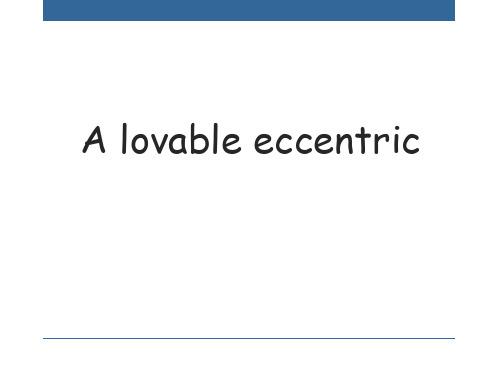
disregard v. 不顾,漠视(ignore)
disregard social conventions 不顾社会习俗 disregard one's opposition/warnings/advice Disregard noise and keep working. disregard n.漠视 in disregard of 不顾,忽视,漠视 He did the work in disregard of my instructions. treat sb. with disregard怠慢某人 Anyway, don't treat your friends with disregard.
elaborate adj.精心构思的
an elaborate design/story /plan vt. 精心设计构思 He elaborated a system of computer.
win sb. sth.
The advertisment wins the company huge sums of money win sb's approval 支持 win sb's trust win sb's heart 赢得芳心
add up to
The total fee adds up to as much as $5000
request 求见(正式,礼貌,语气强烈)
I requested the headmaster. Every student can request assistance of their teacher.
Michael Jordan,a legendary figure in US basketball,was considered to be the best player of the 1980s and 1990s. legend ①n.传奇故事 the legend of King Arthur ②n.图标,图例;地图上的说明文字
新概念英语第二册-Lesson31(共39张PPT)
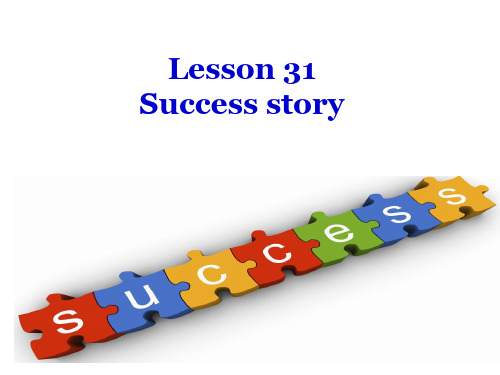
John is the head of the family. 一家之主 Frank is the head of the firm. 弗兰克是那家公司的总裁。
work…as… 作为……工作 He used to work as a teacher. as a boy = as he was a boy (as的意思是“当……的时候”) as a young man 当他年轻的时候
Before he retired, Frank was the head of a very
large business company, but as a boy he used to
work in a small shop.
在退休前,弗兰克是一家非常大的商业公司的经理, 但他小时候却在一家 小铺里做工。
company n. 1) 公司,商号
firm:指两个人以上合资经营的商业机构
a limited (liability)company 有限责任公司 (Ltd.Co)
2) 陪同,交往,交际 eg. I enjoyed his company. 3) 伙伴,朋友,同伴 eg. A man is known by the company he keeps.
It was his job to repair bicycles and at that time he used to work fourteen hours a day.
他那时的工作是修理自行车,并且通常是一天工作十四个小时。
4. it 做形式主语 It is easy for him to solve the problem. 不定式做真实主语 It’s difficult for Jenny to eat a pig. It is necessary that we learn English well. 主语从句
新概念英语第二册lesson31
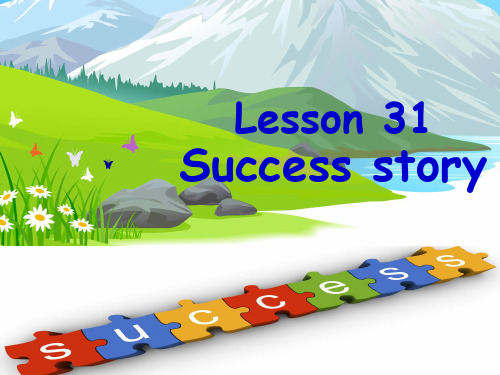
I am use to exercising in the morning.
It was his job to repair bicycles and at that time he used to work fourteen hours a day.
longroadsuccess是一种比喻的说法因为success是抽象名词uto在这里表示方向目的地意义为朝往向等这个短语的字面意义为通向成功的漫漫长路
Lesson 31
Success story
Presentation
There are many famous successful people in the world , such as Bill Gates , Huo Ying dong , Li Jiacheng, Ma Yun , Yu Min hong and so on. Today I’ll tell you a success story about Frank Hawkins . Before he retired he was the boss of a very large business company. Do you want to know how he could succeed ? Let’s go !
Listen and Answer
1.When was Frank the head of a very large business company?
2.How did he earn a living as a boy? 3.What was his job? 4.How many hours a day did he use to work? 5.Did he save money for years? 6.What did he buy in 1958? 7.When did he make spare parts for aeroplanes? 8.What happened to his small workshop? 9.How many employers did he employ? 10.Why did he smile?
新概念英语第一册Lesson31

是由助动词be(am/is/are)加动词-ing形式构成的。
am/is/are +现在分词
现在分词是怎么构成的?
①普通动词是在词末加“-ing”;比如:
work----- working sweep-----sweeping
②以不发音的字母-e结尾,去-e再加-ing;比如:
come----- coming
既可以跟表示人的名词,也可以跟
表示物的名词。
通常用在有上下文的语境中,用于询问对方的情况 或者征求别人的意见。比如:
My brother is a policeman, what about your brother? 相当于“How about”后接名词,代词,或动名词。 比如:
Dogs have four legs, what about monkeys? 狗有4条腿,猴子呢? 8.It’s running across the garden.它正在跑过花园。 本句中across是个介词,它的意思是“横穿”,run across这个动词词组的意思是“跑步穿过”, 或者“跑过”。比如:
She’s sitting under the tree.
1.什么时候用现在进行时?
1)表示说话时正在发生或进行着的动作。比如:
She is drinking milk now.她现在正在喝牛奶。
2)表示现阶段正在进行而说话时不一定正在进行
的动作。比如:
We are working on a farm these days.我们这些日子
在农场上工作。
Lesson 31 Where’s Sally? 萨利在哪里?
garden [´gɑ:dn] n.花园 under [´ʌndə ] prep.在……之下 tree [tri:] n.树 climb [klaɪm] v.爬,攀登 who [hu:] pron.谁 run [rʌn] v.跑 grass [grɑ:s] n.草,草地 after [´ɑ:ftə] prep.在……之后 across [ə ´krɒs] prep.横过,穿过 cat [kæ t] n.猫
(完整版)新概念英语第二册-Lesson31(共39张PPT)
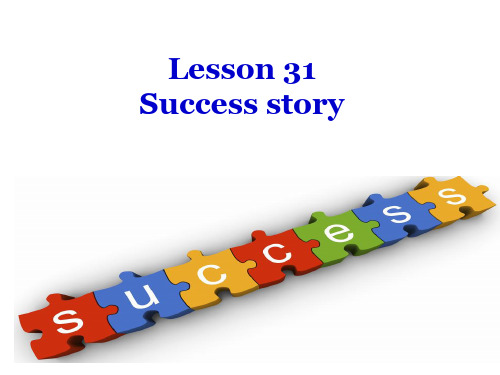
save v. 2)储存,积蓄,节省,省去
eg. He save money for years and bought a house.
eg. Save your strength for the hard work you’ll have to do later.
savings n. 积蓄
helper n. 帮手,助手 assistant n. 助手
experiences n. (C) 经历
I had a strange experience last year.
knowledge or skill from doing, seeing or feeling things
experience n. (U) 经验
I don't think she has the experience for the job. In my experience, people generally smile back if you smile at them.
company n. 1) 公司,商号
firm:指两个人以上合资经营的商业机构
a limited (liability)company 有限责任公司 (Ltd.Co)
2) 陪同,交往,交际 eg. I enjoyed his company. 3) 伙伴,朋友,同伴 eg. A man is known by the company he keeps.
(shop assistant n. 售货员)
help v. 帮助
eg. Help me! 救命 can‘t help doing sth. 忍不住做…… eg. On hearing the news , I can’t help laughing.
新概念第二册Lesson31
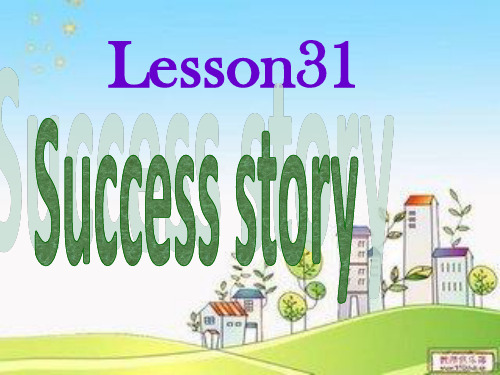
grandson n.孙子,外孙子 grand用以构成复合名词,表示家族关 系 granddaughter 外孙女,孙女 9randmother 祖母,外祖母 grandfather 祖父,外祖父 9randpa 祖父,外祖父 grandma 祖母,外祖母
granny 老奶奶 great-grandson 曾孙子 great-grandfather 曾祖父 Every potter praises his pot 王婆卖瓜卖弄自夸。 grandfather clock 落地式大摆钟。
Yesterday afternoon Frank Hawkins was telling me about his experiences as a young man.
as a young man/when he was a young man 时间状语,交代叙述时间为过去时
experience
I am retired now so I have time to learn English.
retirement n.退休,退职
a graceful retirement 体面的退休 compulsory retirement 强迫退休
resign vi.辞职
I was tired of my boring job, so I resigned yesterday. employ 雇佣 employer 雇主 employee 雇员 hire 雇佣 recruit 招募,征募 解雇: dismiss fire 失业: be out of work lose one' s job hired,tired and fired 被雇佣了,累的半死又被解雇了。
experienced adj.有经验的
新概念英语第3册课程讲义Lesson31
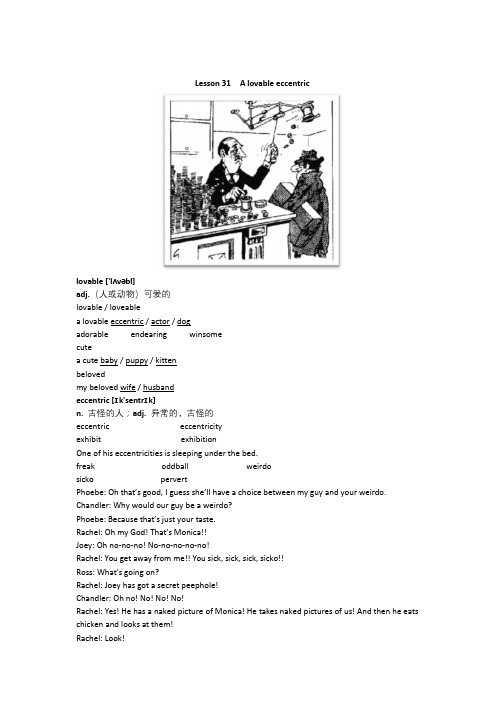
Lesson 31 A lovable eccentriclovable ['lʌvəbl]adj.(人或动物)可爱的lovable / loveablea lovable eccentric / actor / dogadorable endearing winsomecutea cute baby / puppy / kittenbelovedmy beloved wife / husbandeccentric [ɪk'sentrɪk]n. 古怪的人;adj. 异常的,古怪的eccentric eccentricityexhibit exhibitionOne of his eccentricities is sleeping under the bed.freak oddball weirdosicko pervertPhoebe: Oh that’s good, I guess she’ll have a choice between my guy and your weirdo. Chandler: Why would our guy be a weirdo?Phoebe: Because that’s just your taste.Rachel: Oh my God! That's Monica!!Joey: Oh no-no-no! No-no-no-no-no!Rachel: You get away from me!! You sick, sick, sick, sicko!!Ross: What's going on?Rachel: Joey has got a secret peephole!Chandler: Oh no! No! No! No!Rachel: Yes! He has a naked picture of Monica! He takes naked pictures of us! And then he eats chicken and looks at them!Rachel: Look!Ross: Dude! That's my sister!Monica: Give me that!Phoebe: All right, wait! Just wait. Everybody just calm down. Okay? Let's give our friend Joey a chance to explain why he's such a big pervert!Joey: No! I am not a pervert! Okay?disregard [dɪsrɪ'ɡɑ:d]v. 漠视,不顾,不理睬disregard ignoreYou shouldn’t disregard / ignore safety problems.When I saw Jane, I stopped and smiled, but she ________ me and walked on.[A] refused [B] ignored[C] denied [D] misseddisregard ignoreneglect overlookThe joys of travel, having long ____ the disabled, are opening up to virtually anyone who has the means.[A] omitted [B] missed[C] neglected [D] discardedpay no attention to ...take no notice of ...turn a deaf ear to ...turn a blind eye to …convention [kən'venʃn]n. 习俗,风俗,惯例social conventionsaccepted conventionsinternational conventionscustom traditioninstitution practiceOn the other hand, your stomach would turn at the idea of frying potatoes in animal fat—the normally accepted practice in many northern countries.conventional conventional values conventional lifestyle conventional measurestraditional customaryconscious ['kɒnʃəs]adj. 感觉到的,意识到的be conscious of ...be conscious (of the fact) that ...be aware of ...be aware (of the fact) that ...be unconscious of ...be unconscious (of the fact) that ...be unaware of ...be unaware (of the fact) that ...consciousnessenhance people’s consciousness of public moralityintensely [ɪn'tenslɪ]adv. 强烈地intenseintense heat / cold / painintense love / hatred / sufferingintensivean intensive English coursetwo weeks of intensive negotiationsintensive readingextensive readinglabor-intensive industrycapital-intensive industrytechnology-intensive industryknowledge-intensive industryapologetic [əpɒlə'dʒetɪk]adj. 道歉的,表示歉意的be apologetic about ...He was apologetic about his late arrival.apologize apologize to sb. for sth.He apologized to me for his late arrival.apologymake an apology to sb. for sth.owe sb. an apologysay sorry to sb. for sth.reprimand ['reprɪmɑ:nd]v. 训斥,批评reprimand rebukereprimand / rebuke sb. for sth.I was reprimanded / rebuked by my manager for being late.accuse sb. of sth.Dimitri immediately went to Aleko's house and angrily accused him of stealing the lamb. criticize sb. for sth.He was criticized for his delay in dealing with the matter.censure sb. for sth.Ministers were censured for their lack of decisiveness during the crisis.scold sb. for sth.His mother scolded him for breaking her favorite vase.reproach sb. for sth.He reproached me for not answering his letter.blame sb. for sth.blame sth. on sb.They blamed George for the failure.They blamed the failure on George.condemn A for / as BThe movie was condemned for its sexism.The terrorist attack was condemned as an act of barbarism and cowardice.stage [steɪdʒ]v. 组织,策划,举行,举办stage: organizestage a strike / a riot / a plot / a coup / an exhibitionChina staged the 2008 Olympics.deliberatelyon purposeintentionallyset out to do: begin a job, task, etc with a particular aim or goal 带着目的去做某事The journalist immediately set out to obtain these important facts, but he took a long time to send them.Dmitri at once set out to find the thief.We never set out to hurt you, Victor. And I'm sorry we did.Are you done?Yeah.set out / off start out / offFour days after setting out, while the Titanic was sailing across the icy waters of the North Atlantic, …After making a short test flight at 4.15 a.m., Bleriot set off half an hour later.draw (one’s) attentionattract / capture / catch / arrest / command / get (one’s) attentionThis attracted the attention of Richard Humphries who was then the most eminent boxer in England.draw (one’s) attentionattract / capture / catch / arrest / command / get (one’s) attentionreceive (one’s) attentionThis exhibition received a great deal of attention in the press, …They disregard social conventions without being conscious that they are doing anything extraordinary.without being conscious (of the fact) that …without being conscious of ...without being aware (of the fact) that ...without being aware of ...People tend to amass possessions, sometimes without being aware of doing so.(being) unconscious (of the fact) that ...(being) unconscious of ...(being) unaware (of the fact) that ...(being) unaware of ...He used to sleep during the day and work at night, quite unaware of the fact that he had become the ghost of Endley.They disregard social conventions, quite unconscious / unaware of the fact that they are doing anything extraordinary.造句: 他们无视安全问题, 意识不到自己的所作所为有什么危险之处。
新概念第二册Lesson31 (共张PPT)
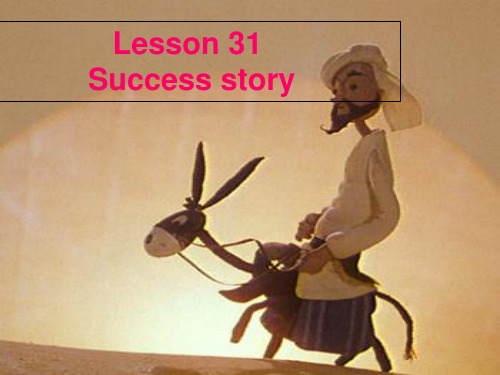
• I have saved up for many years. • Save it for a rainy day. 未雨绸缪
★workshop n. 车间 workshop n. 车间(工作并且 可以拿出来卖)
workhouse n. 感化院(强迫劳 动的地方)
• ★helper n. 帮手, 助手
• John is the head of the family. • used to do sth. 过去常常, 但是现在
• My teacher used to live there. • work…as… 作为……工作
• He used to work as a teacher.
• 2、It was his job to repair bicycles and at that time he used to work fourteen hours a day.
记住
过去进行时与一般过去时
• 过去进行时表示过去某个时刻或某段 时间正在进行的动作,和一般过去时 经常在一个句子里使用。与一般过去 时相比,它更强调动作的持续性,一 般过去时则表示比较短暂的动作或事 件。在叙述故事时,过去进行时往往 用来表示背景。
• When I was watering the garden, it began to rain.
•
16、业余生活要有意义,不要越轨。2021/8/72021/8/7August 7, 2021
• in a few years 在一些年之后
• …factory which employed… 工厂雇佣……(除了人可以雇佣外, 工厂、公司也可以这样表达)
• 6、Frank smiled when he remembered his hard early years and the long road to success.
- 1、下载文档前请自行甄别文档内容的完整性,平台不提供额外的编辑、内容补充、找答案等附加服务。
- 2、"仅部分预览"的文档,不可在线预览部分如存在完整性等问题,可反馈申请退款(可完整预览的文档不适用该条件!)。
- 3、如文档侵犯您的权益,请联系客服反馈,我们会尽快为您处理(人工客服工作时间:9:00-18:30)。
Lesson 31 Success story★retire v. 退休retire =stop working =stop doing thisHe is getting old, He is going to retire. 他越来越老, 他打算退休了I'm going to retire next year. 我明年会退出影坛或歌坛I'm so tired that I'm going to retire now. (retire = go to bed)★company n. 公司firm n. 商行corporation n. 责任公司limited corporation 有限责任公司(缩略形式:Ltd.Co)business n. 生意,公司 He works in my business. 他在我的公司工作★save vt. 积蓄① vt. 挽救,救助,拯救save one's lifeThe doctor saved the child’s life.They saved the child from the fire.save one's face 挽会面子② vt. 积蓄,储蓄save money 存钱西方人不喜欢提钱, 所以用 save up 表示存钱I have saved up for many years. 我已经存了好几年的钱Save it for a rainy day. 未雨绸缪, 为将来需要而做好准备★workshop n. 车间workshop n. 车间(工作并且可以拿出来卖)workhouse n. 感化院(强迫劳动的地方)★helper n. 帮手, 助手assistant n. 助理★employ v. 雇佣employee n. 雇员;employer n. 雇主trainer n. 教练;trainee n. 接受训练的人【课文讲解】1、Before he retired, Frank was the head of a very large business company, but as a boy he used to work in a small shop.head是“首领、头目”的意思,“the head of+名词”的意思是“……的老板,头”John is the head of the family. 一家之主Frank is the head of the firm. 弗兰克是那家公司的总裁。
used to do sth. 过去常常, 但是现在不做My teacher used to live there. 我的老师过去住在那(现在不住了)He lived there. 他过去住在那(不知道现在是否住在那)work…as… 作为……工作He used to work as a teacher.2、It was his job to repair bicycles and at that time he used to work fourteen hoursa day.at that time =just then =at that moment 那时3、He saved money for years and in 1958 he bought a small workshop of his own.of one's own 自己的,属于自己的(own为代词)Do you have a house of your own?my own book (own 起强调作用, 自己的)用of one's own 或 one's own 由被修饰词的位置决定, 如果被修饰名词在前边, 用of one's own, 如果被修饰名词在后边, 用one's own4、In his twenties Frank used to make spare parts for aeroplanes.in one's -ies 在某人几十岁的时候in one's twenties/thirties/forties/fifties/nineties,十的倍数的复数形式可用于表达近似的、非确定的数量,与所有格形容词连用时表示大约的年龄。
In his fifties, he learned the second language.in the 1980s 在二十世纪八十年代e.g. I worked /began the job in the 1990s.5、In a few years the small workshop had become a large factory which employed seven hundred and twenty-eight people.has become 成长为…… in a few years 在一些年之后6、Frank smiled when he remembered his hard early years and the long road to success.one’s hard early years =early in one’s life 某人的早年艰辛(生活)the long road to success 通往成功的长路There is a long way to go. 还有很长的路要走。
remember v. 记得, 回忆起memory n. 记忆;memorize v. 记住【Key structures】过去进行时与一般过去时过去进行时表示过去某个时刻或某段时间正在进行的动作,和一般过去时经常在一个句子里使用。
与一般过去时相比,它更强调动作的持续性,一般过去时则表示比较短暂的动作或事件。
在叙述故事时,过去进行时往往用来表示背景。
When I was watering the garden, it began to rain.As I was getting on the bus, I slipped and hurt my foot.used to doused to do表示过去有过但现在已不存在的习惯,以便将过去与现在形成对照。
它后面经常用由but now…,but not…any more/any longer等构成的、用了一般现在时的句子以强调过去和现在的不同之处。
I used to smoke, but I don’t any more/longer.He used to be a postman a long time ago. He's a taxi driver now.很久以前他曾是个邮递员, 现在他是个出租车司机.I have given up smoking. I used to smoke very heavily.我已经戒烟了, 过去我吸烟很厉害.I used to collect stamps when I was a boy.当我还是个小男孩时, 我常搜集邮票.used to仅用于一般过去。
它的疑问句和否定句形式可以不用助动词do而用used本身。
Used he to smoke?He usedn’t /used not to smoke.但比较常用的形式是did和didn’tDid he use to smoke?He didn’t use to smoke.在针对used to提问时,一般也用did:I used to be a good swimmer.Did you really? I didn’t even know you could swim.【Special Difficulties】Experience① n. 经历(可数名词)He told me about his experiences as a young man.② n. 经验(不可数名词)They want someone with a lot of experience for this job.Does she have any experience in teaching?③ vt. 经验,体验The village has experienced great changes since 1980.experienced adj. 有经验的,经验丰富的John is an experienced driver.Save① vt.& vi. 救助,搭救,拯救save one's life 挽救某人的生命e.g.The doctor saved the child’s life.save one's face 挽回面子② vt.& vi. 储蓄,积攒save money 存钱(多余的钱)e.g. He saved (money) for years to buy a car.save it for a rainy day 未雨绸缪Work and Jobwork和job都翻译为“工作”,job为可数名词,一般与“职业、职位”有关,或表示某人的“份内事”;work作“工作”讲时是不可数名词,常指具体的“劳动、作业”或“(待做的)工作或事务”等,也可能表示“上班”。
John is looking for a new job.I’m looking for work as a driver.I am looking for a new job.It was his job to repair bicycles.Lesson 32 Shopping made easy★once adj. 曾经, 以前① once = long long ago 很久以前② once 一次 e.g. I visited my mother once a month. (一次)③ once 连接从句,表示“一旦”e.g. Once you leave my company, you must return the house.★temptation n 诱惑temptation to do sth. ……的诱惑 temptation to steal 偷窃的诱惑tempt sb. to do sth. e.g. What tempted Jane to steal the watch?(not)resist the temptation to do sth. 抵抗(不了)……的诱惑e.g.I can't resist the temptation to laugh.★article n. 物品, 东西① n. 文章 e.g. This is a good article.②n. 物品, 东西(强调的是商店里的一个一个的东西, 是可数名词, 单独的东西, 独立的个体)thing n. 指任何的东西(和article不可相互取代)cargo n. 船货, (车、船、飞机等运输的)货物goods n. 货物, 商店里的货物的总称★wrap v. 包裹wrap sth. up 把……打包e.g. Please wrap them (up) for me.pack v. 打包(指为了携带, 运输的方便而打包)e.g. I will take it. Please wrap them for me. / Please pack them for me.★simply adv. 仅仅 simply = only = just★arrest v. 逮捕① vt. 逮捕,扣留e.g. When she was arrested, she refused to say anything.The criminal was arrested.criminal n. 罪犯, 犯罪者;adj. 犯罪的, 犯法的, 罪恶的② n. 逮捕,扣留sb. be under arrest 某人被逮捕 e.g. Tony is under arrest now.control/under control 控制/被控制③ vt. 吸引(注意等)arrest one's attention 吸引某人的注意The beauty of the woods arrested the tourists. 树林的美丽景色吸引了游客。
